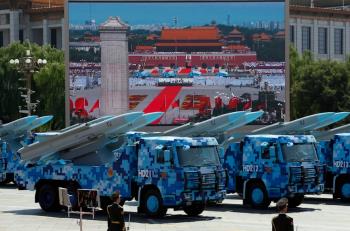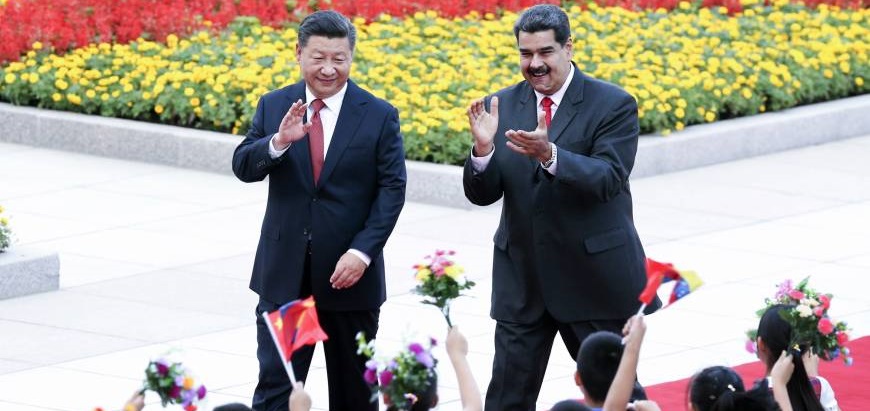Alwaght- During his last week’s visit to Beijing, the Venezuelan President Nicolas Maduro hailed China as the “big sister” of Venezuela in his comments on the nature of the relations between the two countries.
The intention of the visit was not covert. Venezuela is witnessing a chaotic economy with a grave inflation rate which the economists warn could pass the 1 million percent by the end of the year. This was the reason that took the leftist president Maduro to seek help from the Asian and global economic heavyweight to assist with curbing the deteriorating situation. Describing the Beijing-Caracas relations as strategic is far from realistic. But with regard to the international atmosphere and China’s major foreign policy strategies, designing strategic relations between the two communist governments on the two sides of the Pacific Ocean looks quite likely.
China expands its protectionist role worldwide
Over the past decades, the Chinese economy grew fast and enlarged to transform the Asian nation into an economic power. This helped the emergence of a role for China as a supportive power assisting other nations. Since the 1950s, Beijing staged an initiative of South-South Cooperation, suggesting collaboration with other countries in Asia, Africa, the Caribbean Sea, and other parts of the world. The main intent of the Chinese policymakers was to offer a model of cooperation with the developing states different from that offered by the Western powers and particularly the US. Honesty, consistence of interests, convergence, and common development were the key features of China-proposed cooperation formula.
In 2004, the strongest earthquake and Tsunami in 40 years hit the whole Asian and African coastlines, killing over 290,000 people. On the heels of the tragedy, China played as a global power offering an aid package to the victim areas worth of $62 million. In the same year, Hu Jintao, the then Chinese president, visited Brazil, Argentina, Chile, and Cuba, signing with the destination countries 39 cooperation agreements. Over the past two decades, a lot of infrastructural projects like hospitals, bridges, and stadiums were launched in many African, Pacifica Ocean islands, Asian, and Central American states in association with China.
From another perspective, Donald Trump’s election as US president who views the foreign policy by mercantilist lenses and seeks to cut his country’s spending on the allies’ protection and thus cease playing the role of the world police, provided Beijing with a great opportunity to broaden its strategic depth and fill the American place amid Trump administration’s self-isolating policies.
Therefore, the support for Venezuela falls under this Chinese policy. In early July, the Bloomberg economic news agency reported that the Development Bank of China approved a loan of $5 billion for Venezuela to develop its oil production. Further reports maintain that over the past decade, Beijing’s total investment and loans to Caracas went beyond $65 billion.
China’s need for strategic partners worldwide
The Chinese strategists are well aware that to unseat the US as a hegemonic power on the global stage, it takes them to establish strategic bonds with various world countries. Over the past few years, China sought to get a toehold in the US backyard the Latin America after the US embarked on the policy of “pivot to Asia” or “re-balancing” the world order under the former president Barack Obama and also the current president Trump who is waging an extensive trade war against Beijing to curb its thriving influence across the world.
According to the Latin American and Caribbean Economic Association (LACEA), the Chinese foreign direct investment in Latin America touched the $70 billion since 2012, contrary to the US investment in the region that saw a falling rate. Washington’s investment in the region fell to 20 percent in 2016, compared to the 25.7 percent in 2015 and 24 percent in 2012.
Amid the US efforts to back China’s traditional rivals such as India and Japan and deepen the ties with Taiwan, to Beijing’s chagrin, including opening a de facto embassy in Taiwan on July 12, the Chinese leaders appear to take reciprocal steps in Washington’s backyard by diplomatically and economically helping the opponents of the US hegemony which are sanctioned by the White House. Hosting Nicolas Maduro of Venezuela, a strongly anti-US Latin American leader, bears witness to this Chinese policy.
Guaranteeing energy flow
The ruling Communist Party leaders seek to maintain the several-decade fast economic growth of their country as a top priority, amid an intensifying economic competition against the Western powers, mainly the US which thanks to the shale oil has managed to reduce reliance on the West Asia oil supply and itself turn into the world’s largest oil producer. The fight for energy, in fact, determines the fate of the global race for gaining or saving a top position on the world arena. China has a plan to beat the US in the race: It sets up strategic relations with the off-the-US-dominance-circle energy producers such as Venezuela and Iran to proceed with its development programs, like the “One Belt, One Road” cross-border mega project, with greater laxity.
China-developed New Silk Road Project in Latin America
The second China-CELAC (Community of Latin American and Caribbean States) economic forum was held in 2017 in Chile at a foreign ministerial level to discuss a free trade deal. At the meeting, China’s Foreign Minister Wang Yi invited the CELAC countries to play a bigger role in the China-sponsored New Silk Road project that eyes a trade route from Asia to Europe. China’s program for trade and investment in Latin America was raised by President Xi Jinping at Brasilia conference in 2014 and tends to develop projects that will increase the trade with the CELAC to $500 billion by 2019. With this in mind, the alliance with Caracas, while the latter is economically in dire straits, appears to serve Beijing’s ambition for creating a sea, ground, and air route for the final aim of transformation into a global economic leader.



























